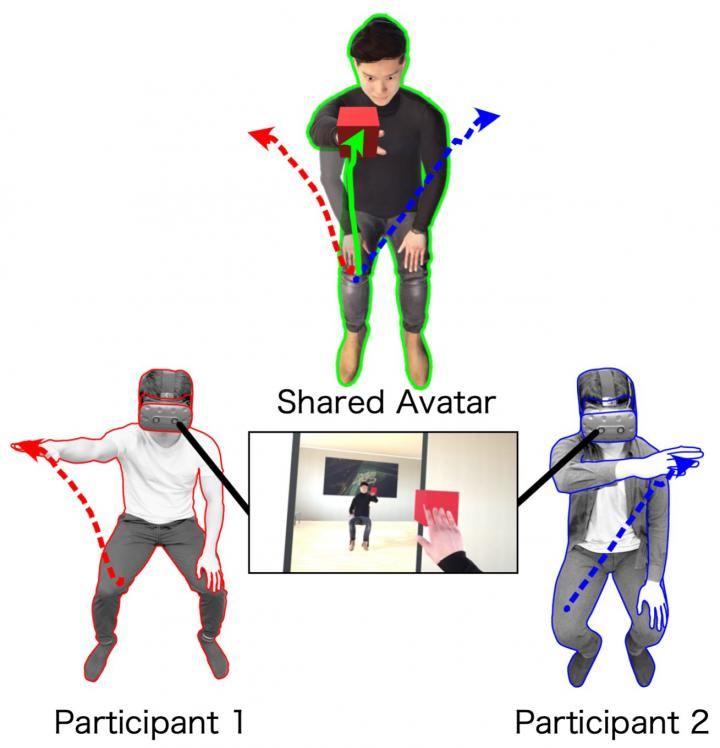Nov 11 2020
The current COVID-19 pandemic has resulted in a considerable increase in the use of cyberspace.
 Movements of two participants were averaged into a shared avatar. The participants observed the shard avatar in a head-mounted display as their own body. When they reached for a target using the avatar’s hand, the avatar’s movement was observed as straighter and less jerky when compared to their own individual movements. Image Credit: Copyright (C) Toyohashi University of Technology. All rights reserved.
Movements of two participants were averaged into a shared avatar. The participants observed the shard avatar in a head-mounted display as their own body. When they reached for a target using the avatar’s hand, the avatar’s movement was observed as straighter and less jerky when compared to their own individual movements. Image Credit: Copyright (C) Toyohashi University of Technology. All rights reserved.
The cyberspace allows people to work together at remote locations and communicate with remote individuals and environments by embodying real avatars, such as robots, or virtual avatars. But the limitations of such avatar embodiments are vague. Moreover, it is unclear as to how these avatar embodiments have an impact on human behavior.
Therefore, a team of researchers has set out to design a new collaboration technique using a shared avatar, which can be handled simultaneously by two people in virtual reality (VR), and to examine the motor behaviors of humans as the avatar is handled in VR.
The research team included graduate student Takayoshi Hagiwara and Professor Michiteru Kitazaki from Toyohashi University of Technology; senior researcher Dr Ganesh Gowrishankar from UM-CNRS LIRMM; Professor Maki Sugimoto from Keio University; and Professor Masahiko Inami from The University of Tokyo.
With the help of a motion-capture system, the researchers tracked the full-body movements, while the movements of the shared avatar were established as the average of the movements of both participants.
Next, a total of 20 participants (10 dyads) were asked to use their right hands to carry out reaching movements towards specific target cubes that were presented to them at numerous places.
The participants displayed excellent reaction times with the shared avatar when compared to individual reaction times, and the hand movements of the avatar were less jerky and straighter when compared to those of the participants.
The participants also displayed body ownership and a sense of urgency towards the shared avatar, albeit they simply formed a part of the shared avatar.
We chose to investigate the arm reaching action because it is a well-established empirical task for investigating motor behavior. Movement straightness and hand jerk are well-known characteristics of human reach behavior, and the shared avatar's movement is straighter and less jerky than those of participants. These results suggest that humans prioritize the movement of the shared body over their own individual movements.
Takayoshi Hagiwara, Graduate Student, Toyohashi University of Technology
Professor Michiteru Kitazaki stated that “Virtual reality can change the appearance of a body via different avatars. The results of our study indicate that humans can also change a one-to-one mind-body correspondence by sharing an avatar with two individuals.”
“The participant implicitly infers their partner's intention to cooperate and subsequently chooses a straighter trajectory for optimizing the predictability of their partner’s avatar trajectory choice,” Professor Kitazaki added.
Communications using avatars in robots or VR are regarded as a significant future mode of interaction between humans. The shared body is expected to be a novel collaboration technique.
Therefore, the researchers will explore how the movement of the shared avatar can be improved by averaging with varying weights of movements of both individuals on the basis of their potential or reliability difference.
The team will also investigate how the human mind and social relationships undergo changes after utilizing a shared body.
The study was funded by JST ERATO Grant Number JPMJER1701 (Inami JIZAI Body Project), and JSPS KAKENHI Grant Number JP20H04489.
Journal Reference:
Hagiwara, T., et al. (2020) Individuals Prioritize the Reach Straightness and Hand Jerk of a Shared Avatar over Their Own. iScience. doi.org/10.1016/j.isci.2020.101732.